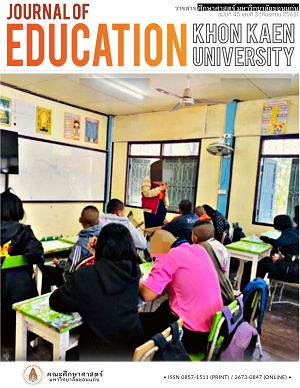ปัจจัยเชิงพฤติกรรมการใช้เฟซบุ๊กที่มีอิทธิพลต่อผลสัมฤทธิ์ทางการเรียนรายวิชาสถิติของนักศึกษาระดับปริญญาตรี มหาวิทยาลัยสงขลานครินทร์ วิทยาเขตสุราษฎร์ธานี
Main Article Content
บทคัดย่อ
งานวิจัยนี้มีวัตถุประสงค์เพื่อศึกษาปัจจัยที่ส่งผลต่อผลสัมฤทธิ์ทางการเรียนของนักศึกษาที่ลงทะเบียนเรียนรายวิชาสถิติ มหาวิทยาลัยสงขลานครินทร์ วิทยาเขตสุราษฎร์ธานี ด้วยเทคนิคการวิเคราะห์หลายตัวแปร โดยใช้การวิเคราะห์ปัจจัย และการวิเคราะห์การถดถอยพหุคูณ โดยใช้ข้อมูลด้วยวิธีเรียกใช้โปรแกรม (API : Application Programming Interface) จากพฤติกรรมการใช้เฟซบุ๊กของนักศึกษาภายใต้กลุ่มเฟซบุ๊กที่ผู้สอนสร้างขึ้นเพื่อประกอบการเรียนการสอนรายวิชาสถิติ ซึ่งมีกลุ่มตัวอย่างขนาด 521 คน โดยวิธีการเลือกแบบเจาะจงตามกลุ่มเรียนที่ผู้วิจัยสอน ผลการวิเคราะห์ปัจจัย พบว่า มี 4 ปัจจัย ได้แก่ (1) เวลาของการแสดงความคิดเห็นและจำนวนการแสดงความคิดเห็นต่อโพสต์ส่งงานและโพสต์ทั้งหมด (2) รีแอ็คชันต่อโพสต์ประกาศและจำนวนการแสดงความคิดเห็นต่อโพสต์การสอบและโพสต์อื่น ๆ (3) รีแอ็คชันทั้งหมดและที่มีต่อโพสต์เข้าเรียน และ (4) รีแอ็คชันต่อโพสต์การสอบ และผลการวิเคราะห์การถดถอยพหุคูณ พบว่า ปัจจัยที่ (1) – (3) ล้วนส่งผลต่อการพยากรณ์ผลสัมฤทธิ์ทางการเรียนรายวิชาสถิติของนักศึกษาอย่างมีนัยสำคัญทางสถิติ ในขณะที่ปัจจัยที่ (4) ไม่ส่งผลต่อการพยากรณ์ผลสัมฤทธิ์ทางการเรียนรายวิชาสถิติของนักศึกษา
Article Details

อนุญาตภายใต้เงื่อนไข Creative Commons Attribution-NonCommercial-NoDerivatives 4.0 International License.
เอกสารอ้างอิง
ชนิตา พิมพ์ศรี และนฤดม พิมพ์ศรี. (2564). ปัจจัยด้านทักษะทางพฤติกรรมที่มีอิทธิพลต่อผลสัมฤทธิ์ทางการเรียนของนักศึกษาระดับปริญญาตรีมหาวิทยาลัยขอนแก่น. วารสารศึกษาศาสตร์ มหาวิทยาลัยขอนแก่น, 44(2), 140-152.
รุ่งรัตน์ กล้าหาญ. (2557). ปัจจัยที่ส่งผลต่อผลสัมฤทธิ์ทางการเรียนภาคปฏิบัติของนิสิตพยาบาลชั้นปีที่ 3 มหาวิทยาลัยศรีนครินทรวิโรฒ. วารสารพยาบาลทหารบก, 15(3), 412-420.
ปรียา ริยาพันธ์ และสันติ โชติแก้ว. (2563). การศึกษาความสัมพันธ์เชิงสาเหตุระหว่างปัจจัยการใช้เฟซบุ๊กและผลสัมฤทธิ์ทางการเรียนของนักศึกษาโดยใช้ตัวแบบสมการเชิงโครงสร้าง. วารสารนวัตกรรมการเรียนรู้ มหาวิทยาลัยวลัยลักษณ์, 6(2), 33-57.
ปรียา ริยาพันธ์ และสันติ โชติแก้ว. (2564). การศึกษาปัจจัยเชิงพฤติกรรมการใช้เฟซบุ๊กที่มีผลต่อผลสัมฤทธิ์ทางการเรียนด้วยการวิเคราะห์การถดถอยพหุคูณ. วารสารราชภัฏสุราษฎร์ธานี, 8(1), 199-227.
Ainin, S., Naqshbandi, M. M., Moghavvemi, S., & Jaafar, N. S. (2015). Facebook usage, socialization and academic performance. Computers and Education, 83(1), 64-73
Al-dheleai, Y. M., & Tasir, Z. (2017). Using Facebook for the Purpose of Students’ Interaction and its Correlation with students’ Academic Performance. The Turkish Online Journal of Educational Technology. 16(4), 170-178.
Arumugan. R. N. (2014). Student’s attitude towards introductory statistics course at public university using partial least square analysis. Interdisciplinary Journal of Contemporary Research in Business, 6(4), 94-123.
Carreon, A. V., Valenzuela, M. M., Tayag, J. R., & Dizon, C. S. (2019). Students who spend more time on Facebook tend to have higher grades: Findings from a Philippine university. International Journal of Research Studies in Education, 8(4), 27-37.
Essays, U.K. (2018). Facebook as a learning tool. Retrieved from https://www.ukessays.com/essays/education/facebook-as-a-learning-tooleducation-essay.php?vref=1
Hassan, I. S. (2014). Facebook as a tool for teaching and learning. Retrieved from https://www.researchgate.net/publication/282251534_FACEBOOK_AS_A_TOOL_F OR_TEACHING_AND_ LEARNING/ citations
Facebook. (2020). Facebook Insight. Retrieved from https://www.facebook.com/ads/audience- insights/ people?act=14 25764647661766&age=18-&country=TH
Hatfield, E., Walster, G. W., & Berscheid, E. (1978). Equity: Theory and research. Boston: Allyn and Bacon.
Junco, R. (2011). The relationship between frequency of Facebook use, participation in Facebook activities, and student engagement. Computers and Education, 58(1), 162-171.
Junco, R. (2012a). Too much face and not enough books: The relationship between multiple indices of Facebook use and academic performance. Computers in Human Behavior, 28(1), 187–198.
Junco, R. (2012b). The relationship between frequency of Facebook use, participation in Facebook activities, and student engagement. Computers and Education, 58(1), 162-171.
Junco, R. (2015). Student class standing, Facebook use, and academic performance. Journal of Applied Developmental Psychology, 36(1), 18-29.
Kaiser, H. F. (1970). A second generation little jiffy. Psychometrika, 35(4), 401-415.
Krasnova, H., Wenninger, H., Widjaja, T., & Buxmann, P. (2013). Envy on Facebook: A Hidden Threat to users’ life satisfaction? 11th International conference on Wirtschaftsinformatik (1-16), Leipzig, Germany
Lomborg, S., & Bechmann, A. (2014). Using APIs for data collection on social media. The Information Society, 30(4), 256-265. Retrived from https://doi.org/10.1080/ 01972243.2014.915276
Lin, R., & Utz, S. (2015). The emotional responses of browsing Facebook: Happiness, envy, and the role of tie strength. Computers in Human Behavior, 52, 29–38.
Minitab Blog Editor. (2013). Regression Analysis: How Do I Interpret R-squared and Assess the Goodness-of-Fit? Retrieved from https://blog.minitab.com/en/adventures-in-statistics-2/regression-analysis-how-do-i-interpret-r-squared-and-assess-the-goodness-of-fit
Moghavvemi, S., Sulaiman, A., Aziz, A. A., & Wai, P. S. (2017). The Impact of Facebook Usage on Academic Performance. [Paper presentation]. 2017 International Conference on Research and Innovation in Information System, Langkawi.
Murad, A., Gul, A., Changezi, R., Naz, A, & Khan, N. (2019). Effects of Facebook usage on the academic performance on the undergraduate students of Quetta City. Clinical Social Work and Health Intervention, 10(2), 70-79.
Navarro, D. J., & Foxcroft, D. R. (2019). learning statistics with jamovi: a tutorial for psychology students and other beginners. (Version 0.70). DOI: 10.24384/hgc3-7p15
Prescott, J., Stodart, M., Becket, G., & Wilson, S. (2013). The Experience of using Facebook as an Educational Tool. Health and Social Care Education, 1-5.
Sassenberg, K. and Vliek, M. L. W. (2019). Social Psychology in Action: Evidence-Based Interventions from Theory to Practice. Cham, Switzerland: Springer Nature Switzerland AG.
Sereetrakul, W. (2013). Students’ Facebook usage and academic achievement: A case study of private university in Thailand. Proceedings of the International Conference on Cognition and Exploratory Learning in Digital Age, (pp. 40-46), USA.
Tian, Y., Galery, T., Dulcinati, G., Molimpakis, E., & Sun C. (2017). Facebook Sentiment: Reactions and Emojis. Proceedings of the Fifth International Workshop on Natural Language Processing for Social Media, (pp. 11-16), Spain.
Thuseethan, S., & Kuhanesan, S. (2014). Influence of Facebook in academic performance of Sri Lankan University students. Journal of Computer Science and Technology, 14(4), 28-35.
Wanzer, D., Postlewaite, E., & Zargarpour, N. (2019). Relationship Among Noncognitive Factors and Academic Performance: Testing the University of Chicago Consortium on School Research Model. AERA Open, 5(4), 1-20.


